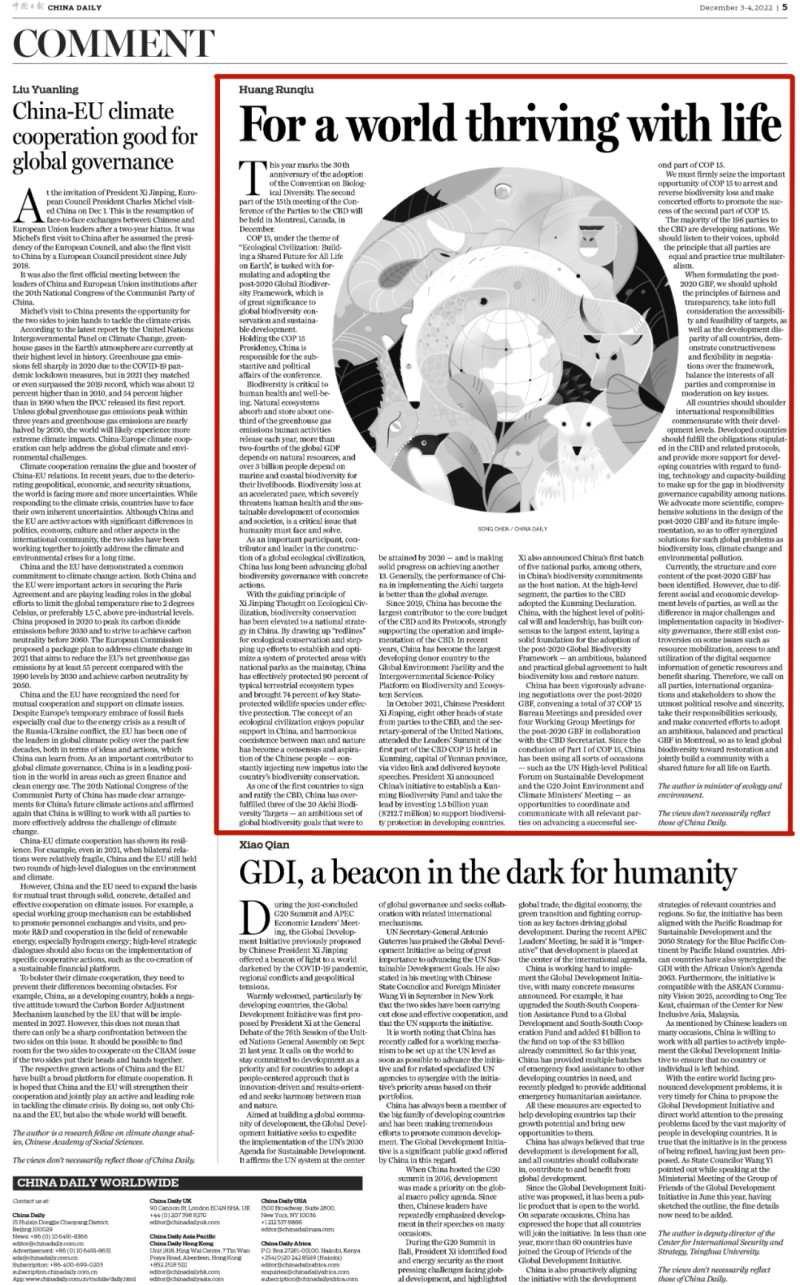
This year marks the 30th anniversary of the adoption of the Convention on Biological Diversity. The second part of the 15th meeting of the Conference of the Parties to the CBD will be held in Montreal, Canada, in December.
COP15, under the theme of "Ecological Civilization: Building a Shared Future for All Life on Earth", is tasked with formulating and adopting the post-2020 Global Biodiversity Framework, which is of great significance to global biodiversity conservation and sustainable development. Holding the COP15 Presidency, China is responsible for the substantive and political affairs of the conference.
Biodiversity is critical to human health and well-being. Natural ecosystems absorb and store about one-third of the greenhouse gas emissions human activities release each year, more than two-fourths of the global GDP depends on natural resources, and over 3 billion people depend on marine and coastal biodiversity for their livelihoods. Biodiversity loss at an accelerated pace, which severely threatens human health and the sustainable development of economies and societies, is a critical issue that humanity must face and solve.
As an important participant, contributor and leader in the construction of a global ecological civilization, China has long been advancing global biodiversity governance with concrete actions.
With the guiding principle of Xi Jinping Thought on Ecological Civilization, biodiversity conservation has been elevated to a national strategy in China. By drawing up "redlines" for ecological conservation and stepping up efforts to establish and optimize a system of protected areas with national parks as the mainstay, China has effectively protected 90 percent of typical terrestrial ecosystem types and brought 74 percent of key State-protected wildlife species under effective protection. The concept of an ecological civilization enjoys popular support in China, and harmonious coexistence between man and nature has become a consensus and aspiration of the Chinese people — constantly injecting new impetus into the country's biodiversity conservation.
As one of the first countries to sign and ratify the CBD, China has over-fulfilled three of the 20 Aichi Biodiversity Targets — an ambitious set of global biodiversity goals that were to be attained by 2020 — and is making solid progress on achieving another 13. Generally, the performance of China in implementing the Aichi targets is better than the global average.
Since 2019, China has become the largest contributor to the core budget of the CBD and its Protocols, strongly supporting the operation and implementation of the CBD. In recent years, China has become the largest developing donor country to the Global Environment Facility and the Intergovernmental Science-Policy Platform on Biodiversity and Ecosystem Services.
In October 2021, Chinese President Xi Jinping, eight other heads of state from parties to the CBD, and the secretary-general of the United Nations, attended the Leaders' Summit of the first part of the CBD COP15 held in Kunming, capital of Yunnan province, via video link and delivered keynote speeches. President Xi announced China's initiative to establish a Kunming Biodiversity Fund and take the lead by investing 1.5 billion yuan ($212.7 million) to support biodiversity protection in developing countries. Xi also announced China's first batch of five national parks, among others, in China's biodiversity commitments as the host nation. At the high-level segment, the parties to the CBD adopted the Kunming Declaration. China, with the highest level of political will and leadership, has built consensus to the largest extent, laying a solid foundation for the adoption of the post-2020 Global Biodiversity Framework — an ambitious, balanced and practical global agreement to halt biodiversity loss and restore nature.
China has been vigorously advancing negotiations over the post-2020 GBF, convening a total of 37 COP15 Bureau Meetings and presided over four Working Group Meetings for the post-2020 GBF in collaboration with the CBD Secretariat. Since the conclusion of Part I of COP15, China has been using all sorts of occasions — such as the UN High-level Political Forum on Sustainable Development and the G20 Joint Environment and Climate Ministers' Meeting — as opportunities to coordinate and communicate with all relevant parties on advancing a successful second part of COP15.
We must firmly seize the important opportunity of COP15 to arrest and reverse biodiversity loss and make concerted efforts to promote the success of the second part of COP15.
The majority of the 196 parties to the CBD are developing nations. We should listen to their voices, uphold the principle that all parties are equal and practice true multilateralism.
When formulating the post-2020 GBF, we should uphold the principles of fairness and transparency, take into full consideration the accessibility and feasibility of targets, as well as the development disparity of all countries, demonstrate constructiveness and flexibility in negotiations over the framework, balance the interests of all parties and compromise in moderation on key issues.
All countries should shoulder international responsibilities commensurate with their development levels. Developed countries should fulfill the obligations stipulated in the CBD and related protocols, and provide more support for developing countries with regard to funding, technology and capacity-building to make up for the gap in biodiversity governance capability among nations. We advocate more scientific, comprehensive solutions in the design of the post-2020 GBF and its future implementation, so as to offer synergized solutions for such global problems as biodiversity loss, climate change and environmental pollution.
Currently, the structure and core content of the post-2020 GBF has been identified. However, due to different social and economic development levels of parties, as well as the difference in major challenges and implementation capacity in biodiversity governance, there still exist controversies on some issues such as resource mobilization, access to and utilization of the digital sequence information of genetic resources and benefit sharing. Therefore, we call on all parties, international organizations and stakeholders to show the utmost political resolve and sincerity, take their responsibilities seriously, and make concerted efforts to adopt an ambitious, balanced and practical GBF in Montreal, so as to lead global biodiversity toward restoration and jointly build a community with a shared future for all life on Earth.
开创全球生物多样性治理新局面
共建地球生命共同体
黄润秋
今年是联合国《生物多样性公约》(简称《公约》)通过30周年。中国作为《公约》缔约方大会第十五次会议(简称COP15)主席国,负责领导大会实质性和政治性事务,继2021年10月第一阶段会议在中国云南昆明成功举办后,第二阶段会议将于今年12月在加拿大蒙特利尔召开。COP15以“生态文明:共建地球生命共同体”为主题,旨在制定并通过“2020年后全球生物多样性框架”(简称“框架”),擘画未来10年乃至更长一个时期全球生物多样性治理的蓝图,对全球生物多样性保护和可持续发展具有十分重大的意义。
生物多样性关系人类福祉,是人类赖以生存和发展的重要基础,是地球生命共同体的血脉和根基。每年全球约1/3的温室气体排放被自然生态系统吸收,一半以上的GDP总量依赖自然资源的贡献,超过30亿人的生计依赖于海洋和沿海的生物多样性,70%的贫困人口通过农业、渔业、林业等活动维持生计。生物多样性与应对气候变化、粮食安全、全球减贫等可持续发展目标存在重要内在联系,保护生物多样性就是保护人类福祉,促进人类可持续发展。然而,当前地球生态系统正在遭到破坏,全球生物多样性正在加速丧失,已严重威胁到人类健康和经济社会的可持续发展,这是人类面临的共同挑战,也是我们必须正视和需要解决的难题。
一、生物多样性保护,中国在行动
中国高度重视生物多样性保护,在习近平生态文明思想的指引下,牢固树立和践行绿水青山就是金山银山的理念,将生物多样性保护上升为国家战略,推行一系列保护措施,取得显著成效,促进了人与自然和谐共生。
建立健全生物多样性保护体制机制和政策体系。2011年,成立生物多样性保护国家委员会,统筹协调全国生物多样性保护工作,指导“联合国生物多样性十年中国行动”;发布并实施《中国生物多样性保护战略与行动计划(2011—2030年)》及22个地方生物多样性保护战略与行动计划。近10年来,颁布和修订森林法、草原法、渔业法、野生动物保护法、种子法、湿地法、长江保护法、生物安全法等20多部相关法律法规。2020年发布《全国重要生态系统保护和修复重大工程总体规划(2021—2035年)》,提出到2035年,森林覆盖率达到26%,草原综合植被覆盖度、湿地保护率提高到60%,自然海岸线保有率不低于35%,以国家公园为主体的自然保护地占陆域国土面积18%以上,濒危野生动植物及其栖息地得到全面保护等目标。2021年发布《中国的生物多样性保护》白皮书,全面总结生物多样性治理的举措和成效;出台《关于进一步加强生物多样性保护的意见》,成为全面推进中国生物多样性保护工作的纲领性文件。
有力落实生物多样性保护举措。创新开展生态保护红线划定工作,陆域红线面积占陆域国土面积比例超过30%,覆盖重要生态区域。积极推进以国家公园为主体的自然保护地体系建设,设立首批5个国家公园,各类自然保护地总数近万处,约占陆域国土面积18%。建立植物园、野生动物救护繁育基地以及种质资源库、基因库等较为完备的迁地保护体系,成立首个国家植物园,建立近200个植物园(树木园)、250处野生动物救护繁育基地。初步形成全国生物多样性观测网络,建立749个观测样区,完成对全国高等植物、脊椎动物和大型真菌濒危状况评估。加强天然林保护,推进山水林田湖草沙一体化保护和系统治理,成为全球“增绿”的主力军。对长江等重点流域和水域实行禁捕政策,严防外来物种入侵,严厉打击珍贵濒危野生动植物的走私等。
中国的生物多样性保护政策及行动有效保护了90%的陆地生态系统类型和74%的国家重点保护野生动植物种群。在中国大地上,云南野象自由“旅行”,大熊猫受威胁程度等级从“濒危”降为“易危”,“微笑天使”长江江豚频频亮相,三江源国家公园等地雪豹频繁现身,“消失”30多年的云猫重现高黎贡山自然保护区,青藏高原复现藏羚羊“万羊齐奔”的壮丽景象。生态文明理念在中国深入人心,人与自然和谐共生成为中国人民的共识和期盼,从中央到地方、从生态环境部门到其他政府部门,从企业、民间组织到媒体和公众,对生物多样性的重要性都有了更深刻的认识和理解,为中国的生物多样性保护提供源源不断的前进动力。
二、推动全球生物多样性治理,作出中国贡献
作为全球生态文明建设的重要参与者、贡献者和引领者,中国长期以来用实际行动积极推动全球生物多样性治理进程,为推动实现全球生物多样性保护目标作出中国贡献。
作为最早签署和批准《公约》的国家之一,中国积极履行《公约》及其议定书,“爱知目标”(2020年全球生物多样性目标)中的设立陆地自然保护区、恢复和保障重要生态系统服务、增加生态系统的复原力和碳储量等3项目标超额完成,生物多样性主流化、可持续管理农林渔业、可持续生产和消费等13项目标取得良好进展,总体好于全球平均水平。2019年起,中国成为《公约》及其议定书核心预算的最大捐助国,有力地支持了《公约》的运作和执行,并且多年来一直是向全球环境基金(GEF)、生物多样性和生态系统服务政府间科学—政策平台(IPBES)捐资最多的发展中国家。
申办COP15是中国致力于推动和引领全球生物多样性进程的使命所然。在COP15第一阶段会议上,中国国家主席习近平和其他8位缔约方国家领导人、联合国秘书长视频出席并发表主旨讲话。习近平主席宣布中国率先出资15亿元成立昆明生物多样性基金,正式设立第一批国家公园,出台碳达峰、碳中和“1+N”政策体系等一系列东道国举措,展示了中国的决心与行动,对国际社会起到了示范引领作用。大会通过了《昆明宣言》,为推进全球生物多样性治理注入强大信心和政治推动力。中国以最高级别的政治意愿和领导力,凝聚最广泛共识,为推动达成兼具雄心和务实平衡的“框架”奠定了坚实基础。
作为COP15主席国,中国一直积极推动“框架”磋商进程,已组织召开了36次COP15主席团会议,并与《公约》秘书处一道先后在日内瓦、内罗毕等地主持召开了4次“框架”工作组会议,为推动“框架”磋商作出重要努力。自第一阶段会议结束以来,中国利用联合国可持续发展高级别政治论坛、20国集团环境与气候部长联席会议、第77届联合国大会高级别周、《联合国气候变化框架公约》第27次缔约方会议生物多样性日等场合和时机,组织召开COP15重要议题交流会、高级别圆桌会等,与各国就推动COP15第二阶段会议成功召开进行沟通协调,有效提振了COP15政治势头。
三、呵护蓝色地球,需要全球携手
COP15及正在制定的“框架”将推动生物多样性保护在经济社会发展中的主流化进程,使全人类能够享受生物多样性为减少贫困、维护粮食安全、促进可持续发展带来的惠益。我们必须牢牢把握COP15扭转全球生物多样性丧失的重要契机,牢牢守住绿色可持续发展的前进方向,共同努力推动COP15第二阶段会议取得成功。
一是坚持多边主义。生物多样性治理是一项全球系统工程,只有确保广泛参与,才能取得真正实效。《公约》196个缔约方以发展中国家占多数,他们在保护生物多样性、维护国际法等方面发挥着重要作用,我们主张倾听他们的声音,重视他们的诉求,坚持缔约方不分大小、强弱、贫富一律平等,维护国际法的权威性和普遍适用性,践行真正的多边主义。
二是坚持务实合作。各国国情不同,在经济、技术、管理等方面的差异明显。我们主张在制定“框架”时,坚持公正、透明、缔约方驱动的原则,充分吸取和借鉴“爱知目标”执行中的经验和教训,充分考虑目标的可达性、可操作性以及各国的发展差异,在“框架”磋商中展现建设性和灵活性,在重点难点议题上兼顾各方诉求并适当妥协,达成各方均能接受的折中方案,平衡体现《公约》3大目标。
三是坚持基于规则行事。全球生物多样性保护面临巨大的资金缺口,充足可靠的资金来源对实现“框架”雄心至关重要。我们主张积极承担与发展水平相称的国际责任,发达国家应切实履行《公约》义务,在资金、技术、能力建设等方面为发展中国家提供更多支持,弥补国家间生物多样性治理能力的差距。中国将深化“一带一路”生态环境合作和“南南合作”等,积极向其他发展中国家和不发达国家提供力所能及的援助。
四是坚持协同治理。中国积极践行协同治理并在实践中受益。我们主张协同打造更牢固的全球生态安全屏障,加强生物多样性保护与执行联合国《2030年可持续发展议程》之间的协同,加强联合国《生物多样性公约》(UNCBD)与《联合国气候变化框架公约》(UNFCCC)、《联合国防治荒漠化公约》(UNCCD)等的协同,在“框架”设计及未来实施进程中提出更多科学的综合解决方案,协同应对生物多样性丧失、气候变化和环境污染等全球性问题。
目前,在中国的积极协调和多方共同努力下,“框架”结构和核心内容已确定。但由于196个缔约方经济社会发展水平差异较大,生物多样性治理面临的主要挑战和执行能力各异,在资源调动、遗传资源数字序列信息的获取利用和惠益分享等重点议题上仍存在一些争议。为此,我们真诚呼吁,各缔约方与国际组织和利益攸关方密切合作,展现最大的政治决心和诚意,严肃对待肩负的重要责任,共同努力在COP15第二阶段会议上顺利通过国际社会期待已久的、兼具雄心和务实平衡的“框架”,引领全球生物多样性走向恢复之路,共建地球生命共同体!


